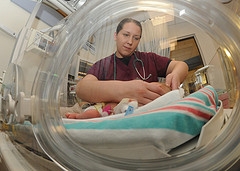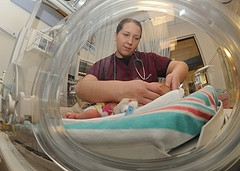Babies born by Cesarean section are more likely to develop allergies and asthma by age two, according to a study presented February 26, 2013, at the American Academy of Allergy, Asthma and Immunology annual meeting in San Antonio, TX. This comes from The Henry Ford Hospital in Detroit, MI and leaves many professional to question the need for mothers to have Cesarean sections. 
According to the Agency for Healthcare Research and Quality, 66% of the more than 4 million babies born in the US in 2010 were delivered via c-section. And an estimated five million US children under age 18 have asthma, according to the Asthma and Allergy Foundation of America. Allergies are the 3rd most common chronic disease in children under 18.
According to Christine Johnson, head of the Department of Health Services at Henry Ford Hospital in Detroit and the lead author the study, a child born naturally is exposed to bacteria in the birth canal. This then makes the child exposed to certain allergens less likely to produce high levels of Immunoglobulin E (IgE), an antibody that travels through your cells and releases certain chemicals that then cause an allergic reaction. Children born through c-section are not able to build up their immune system.
To understand this, they monitored the IgE levels in newborns and children up to the age of two who were born through a c-section. Her study then found the correlation between children born by c-section and asthma and allergies. “[Children born by c-section are] being sensitized to the allergens [which] we looked at is a strong risk factor for developing asthma in children,” said Johnson. “Others have shown a slight increase in risk for asthma among c-sectioned babies.”
Suren Thavagnanam at the Royal Belfast Hospital for Sick Children in Northern Ireland and his colleagues analyzed 22 pervious studies on the same subject. Thavagnanam’s team was able to find that there was a 20% increase in asthma risk in children delivered by c-section.
“While it may not be the same for other countries, this would point directly at the fact that asthma and c-sections are related. If there is a 20% increase in asthma when born by caesarean sections that has to mean something,” says Thavagnanam.
It should be known that it cannot be prevented and there is no known cure for asthma or allergies. Johnson suggests that “Keeping the child's environment as clean and "sterile" as possible also seems to result in a higher risk of sensitization [to allergens].”
C-sections are sometimes the best option, because some mothers cannot have natural births and when the mother, child, or both are in deteriorating health. However, according to Mike Shields, a respiratory pediatrician at Queen’s University in Belfast, Northern Ireland, “The government of Ireland is trying to reduce the number of inappropriate c-sections.” An inappropriate c-section is when a women has a c-section that is not in the best interest for her or her child and she is able to have a natural birth. This happens a lot in Ireland, says Shields, and even in the US. Katelyn Stevenson

This work is licensed under a Creative Commons Attribution-NonCommercial-NoDerivs 3.0 Unported License

















This is very interesting because I was born through an emergency c-section and found out when I was three that I have a severe allergy to cocoanut that causes me to go into anaphylactic shock almost everytime I come in contact with cocoanut.